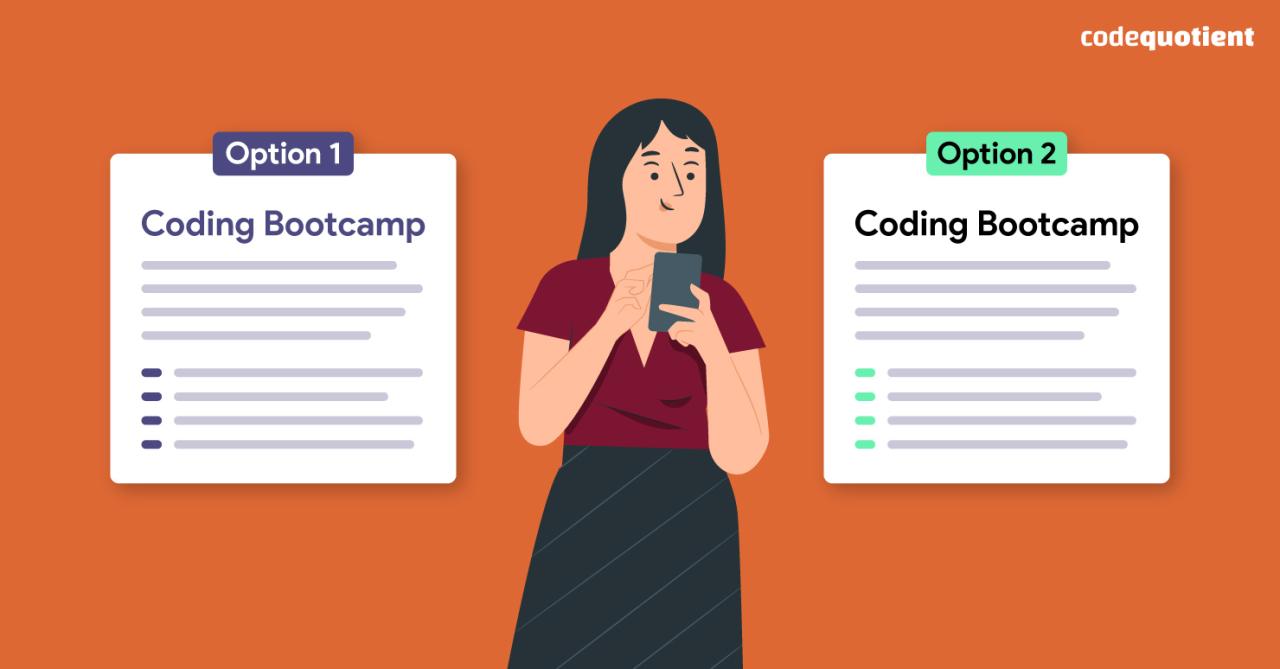Expertise and Support Systems

Choosing a coding bootcamp involves considering not only the curriculum but also the expertise of the instructors and the support systems in place to help you succeed. A strong support network can significantly impact your learning experience and career prospects after graduation. The quality of instruction and the availability of resources are crucial factors in determining the overall value of the bootcamp investment.
The success of a coding bootcamp is often reflected in the accomplishments of its graduates. A robust support system is essential for navigating the challenges of a fast-paced, intensive learning environment.
Instructor Expertise and Qualifications
Bootcamps attract instructors with diverse backgrounds, including those with extensive industry experience, advanced degrees in computer science, or a combination of both. For example, App Academy emphasizes its instructors’ experience at top tech companies like Google and Facebook, showcasing their practical, real-world expertise. Flatiron School often highlights instructors with Master’s degrees in relevant fields, demonstrating a strong academic foundation. These diverse backgrounds ensure students receive instruction from individuals who possess both theoretical knowledge and practical application skills. A review of instructor profiles on a bootcamp’s website can provide insight into their qualifications and experience.
Career Services and Mentorship Programs
Many bootcamps provide comprehensive career services to assist graduates in their job search. These services typically include resume and portfolio reviews, mock interviews, and job placement assistance. For instance, General Assembly often boasts a high job placement rate, attributed in part to their extensive career services department. Furthermore, mentorship programs connect students with experienced professionals in the tech industry, offering guidance and support throughout the learning process and beyond. These mentors often provide valuable networking opportunities and insights into industry trends. Some bootcamps even facilitate direct connections with hiring managers at partner companies.
Alumni Networks and Community Support
A strong alumni network can be a valuable resource for graduates, providing ongoing support and networking opportunities. The ability to connect with former students who have successfully transitioned into tech careers can offer invaluable advice, mentorship, and job referrals. For example, many bootcamps host regular alumni events, fostering a sense of community and providing opportunities for networking and professional development. This continued support extends beyond the completion of the program, offering a long-term resource for career advancement.
Comparison of Bootcamp Support Systems
| Bootcamp | Career Services | Mentorship Programs | Alumni Network |
|---|---|---|---|
| App Academy | Resume reviews, mock interviews, job placement assistance | Individualized mentorship with industry professionals | Active alumni network with regular events and job postings |
| Flatiron School | Career workshops, job search strategy sessions, portfolio building | Mentorship opportunities with instructors and industry professionals | Online community forum and regular alumni events |
| General Assembly | Extensive career services department, dedicated career counselors | Mentorship program with industry professionals and alumni | Strong alumni network with job board and networking events |
Alternatives to Coding Bootcamps: Should I Take A Coding Bootcamp

Choosing a path to learn coding can feel overwhelming. Coding bootcamps are a popular option, but they aren’t the only way to acquire valuable programming skills. This section explores viable alternatives and helps you weigh the pros and cons of each approach. Understanding these options allows you to make an informed decision based on your individual learning style, financial situation, and career goals.
Should i take a coding bootcamp – Several alternatives to coding bootcamps exist, each with its own set of advantages and disadvantages. These include online courses, self-teaching through various resources, and pursuing a traditional university degree in computer science or a related field. A careful comparison of these options reveals that the “best” path depends heavily on personal circumstances and preferences.
Comparison of Learning Paths
The following table compares coding bootcamps with online courses, self-teaching, and university degrees. This comparison considers factors such as cost, time commitment, learning style, career support, and the depth of knowledge acquired. Each path offers a unique balance of these factors.
| Feature | Coding Bootcamp | Online Courses | Self-Teaching | University Degree |
|---|---|---|---|---|
| Cost | High (can range from $10,000 to $20,000+) | Varies widely (from free to thousands of dollars) | Relatively low (primarily cost of resources) | Very High (Tuition fees, books, living expenses) |
| Time Commitment | Intensive, typically 3-6 months full-time or 6-12 months part-time | Flexible, self-paced learning | Highly variable, depending on dedication and learning speed | 4 years or more |
| Learning Style | Immersive, hands-on, fast-paced | Structured or unstructured, self-directed | Highly self-directed, requires strong discipline | Structured curriculum, lectures, assignments, and projects |
| Career Support | Often includes career services, job placement assistance | Generally limited or non-existent | Requires self-promotion and networking | May include career counseling and networking opportunities |
| Depth of Knowledge | Focused, practical skills in a specific area | Varies widely depending on the course | Variable, depends on chosen resources and learning approach | Broad and deep theoretical and practical knowledge |
Advantages and Disadvantages of Each Learning Path
Each learning path presents unique benefits and drawbacks. Understanding these aspects is crucial for making an informed decision that aligns with your individual needs and goals. Consider the following summary.
Coding Bootcamps: Advantages include intensive learning, career support, and networking opportunities. Disadvantages include high cost, intense time commitment, and a potentially narrow focus. For example, a bootcamp specializing in web development might not provide sufficient background for a data science role.
Online Courses: Advantages include flexibility, affordability (some are free), and a wide range of subjects. Disadvantages include the lack of structured learning environment and potential for procrastination, along with limited or no career support. Platforms like Coursera and edX offer many free introductory courses that can serve as valuable stepping stones.
Self-Teaching: Advantages include complete control over the learning pace and curriculum, and low cost. Disadvantages include requiring exceptional self-discipline, a lack of structured feedback, and difficulty navigating the vast amount of information available. This approach necessitates a strong proactive learning approach and effective time management.
University Degree: Advantages include a comprehensive education, strong theoretical foundation, and potential for higher earning potential. Disadvantages include high cost, lengthy time commitment, and a less immediately applicable skill set compared to bootcamps.
Criteria for Choosing a Learning Path, Should i take a coding bootcamp
Selecting the appropriate learning path depends on several key factors. A thoughtful evaluation of these factors will greatly improve the chances of success.
Consider your learning style (structured vs. self-directed), your financial resources, your time commitment capabilities, your career goals (specific role vs. broader field), and your need for career support. For instance, someone with limited funds and a strong self-discipline might find self-teaching or free online courses suitable, while someone seeking immediate employment might prefer a bootcamp’s intensive and career-focused approach.
Job Placement and Success Stories

Coding bootcamps often tout high job placement rates, but understanding the nuances behind these claims is crucial. While individual experiences vary, analyzing success rates and examining specific examples provides a clearer picture of the potential return on investment for prospective students. This section explores the employment outcomes of bootcamp graduates and offers insights into factors contributing to their success.
Bootcamp graduates’ success in securing tech jobs varies considerably depending on factors like the bootcamp’s reputation, the student’s prior experience and dedication, and current market conditions. While some bootcamps boast placement rates exceeding 90%, these figures often reflect immediate post-graduation employment and may not encompass long-term career trajectories or the types of roles secured. A more comprehensive analysis needs to consider the median salary, job titles, and overall career satisfaction of graduates. Independent verification of these claims is also important.
Bootcamp Graduate Employment Statistics
Numerous studies and surveys have attempted to quantify the job placement success of coding bootcamp graduates. While precise figures are difficult to obtain due to varying methodologies and self-reporting biases, a general trend suggests that a significant portion of graduates find employment in tech-related roles within a few months of completing their programs. However, it’s important to note that these statistics can be influenced by factors such as the specific bootcamp, the cohort size, and the overall economic climate. For example, a study by Course Report (Note: This requires a verifiable source, replace with actual study data and citation if available) might show an average placement rate of 75% within six months of graduation, but this rate may vary significantly across different institutions. The average salary earned by these graduates should also be considered for a more complete picture.
Success Stories of Bootcamp Graduates
To illustrate the potential impact of coding bootcamps, here are a few fictionalized examples based on common career trajectories:
Example 1: Sarah, a former teacher with a passion for technology, enrolled in a full-stack web development bootcamp. After completing the program, she secured a junior developer position at a rapidly growing startup. Within two years, she received a promotion and is now leading a small team on a key company project. Her improved salary enabled her to pay off student loans and pursue her dream of buying a house.
Example 2: Mark, a recent college graduate with a business degree, felt unfulfilled in his previous role. He decided to transition into software engineering by attending a data science bootcamp. He leveraged his business acumen and technical skills to secure a data analyst position at a major financial institution. He quickly excelled and is now contributing to critical business decisions.
Example 3: Aisha, a stay-at-home parent seeking a career change, enrolled in a front-end development bootcamp. After completing the program, she secured a freelance position, allowing her to work flexible hours while balancing family responsibilities. Her freelance work has gradually increased, leading to a steady income and greater professional fulfillment.
Factors Contributing to Successful Job Placement
Several key factors contribute to the success of bootcamp graduates in securing employment. These include:
Strong performance during the bootcamp: Consistent effort, active participation in class, and completion of projects are essential. Demonstrating a strong understanding of core concepts and building a portfolio of impressive projects significantly increases job prospects.
Effective networking: Building relationships with instructors, fellow students, and industry professionals through networking events, online communities, and career fairs is crucial. These connections can lead to valuable job leads and mentorship opportunities.
A well-crafted portfolio: A portfolio showcasing completed projects is essential for demonstrating skills to potential employers. The portfolio should highlight both the technical skills and problem-solving abilities of the graduate.
Targeted job search strategy: A well-defined job search strategy, including researching companies, tailoring resumes and cover letters to specific job descriptions, and practicing interview skills, is vital for success.
Continuous learning: The tech industry is constantly evolving, so continuous learning and upskilling are essential for long-term success. Graduates should actively seek opportunities to expand their knowledge and skills beyond the bootcamp curriculum.
Assessing Your Readiness
Embarking on a coding bootcamp is a significant commitment of time, money, and effort. Success hinges not only on the quality of the program but also on your individual preparedness. A thorough self-assessment is crucial to determine if you possess the necessary skills and mindset to thrive in this intensive learning environment. Understanding your strengths and weaknesses beforehand will significantly impact your overall experience and likelihood of achieving your career goals.
Before diving into the specifics of a coding bootcamp, it’s vital to honestly evaluate your current skillset and personal attributes. This pre-bootcamp preparation is not just about technical knowledge; it also involves examining your learning style, time management abilities, and problem-solving skills. The more prepared you are, the smoother your transition into the rigorous bootcamp curriculum will be, leading to a more positive and productive learning journey.
Necessary Skills and Qualities
Success in a coding bootcamp requires a blend of technical aptitude and personal characteristics. While prior programming experience is beneficial, it’s not always a prerequisite. More important are a strong aptitude for logical thinking, problem-solving, and a willingness to learn quickly and adapt to new concepts. Persistence and resilience are also essential, as coding often involves facing challenges and overcoming setbacks. Effective communication skills are valuable for collaborating with instructors and peers. Finally, a genuine passion for technology and a proactive approach to learning are key ingredients for success. Bootcamps are fast-paced, so the ability to work independently and manage your time effectively is also crucial.
Importance of Self-Assessment and Pre-Bootcamp Preparation
A comprehensive self-assessment involves more than just taking a few online quizzes. It requires introspection and honest self-evaluation. Consider your comfort level with basic computer skills, your ability to grasp new concepts quickly, and your willingness to dedicate significant time and energy to learning. Pre-bootcamp preparation can involve exploring introductory programming resources online, such as freeCodeCamp or Codecademy, to gauge your interest and aptitude. This allows you to familiarize yourself with fundamental programming concepts and assess whether you enjoy the process of coding. Engaging in personal projects, even small ones, can also help build confidence and demonstrate your commitment.
Checklist of Factors to Consider
Before enrolling, consider the following:
- Financial resources: Can you afford the bootcamp tuition and living expenses during the program?
- Time commitment: Are you prepared for the intensive schedule and long hours required?
- Learning style: Does the bootcamp’s teaching methodology align with your learning preferences?
- Career goals: Does the bootcamp’s curriculum and job placement assistance align with your desired career path?
- Technical aptitude: Have you assessed your logical reasoning and problem-solving skills?
- Support system: Do you have a strong support network to help you through the challenges of the bootcamp?
- Program reputation and reviews: Have you researched the bootcamp’s reputation and read reviews from past students?
Thorough consideration of these factors will significantly increase your chances of a successful and rewarding bootcamp experience.


Tim Redaksi